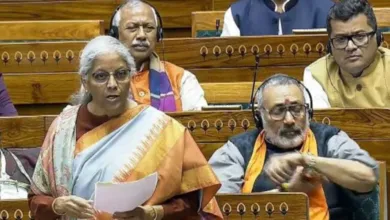
Last week, Union Finance Minister Nirmala Sitharaman, RBI Governor Shaktikanta Das, and IRDAI Chief Debasish Panda voiced their concerns over the persistent issue of mis-selling insurance policies by banks.
At the 11th SBI Banking & Economics Conclave, the finance minister acknowledged the pivotal role banks have played in expanding insurance penetration in India. However, she also highlighted the unintended consequences, such as mis-selling, which indirectly raises borrowing costs for customers. Sitharaman urged banks to refocus on their core activities—mobilizing deposits and lending money—while ensuring transparency, ethical practices, and clear communication to earn public trust.
Debasish Panda, speaking at the same conclave, emphasized the trust customers place in banks and cautioned against exploiting this trust by mis-selling or force-selling insurance products. He stressed that while banks are older institutions than the insurance sector, they must prioritize customers’ interests by offering multiple options rather than coercive sales practices.
RBI Governor Shaktikanta Das, addressing a conference for private-sector bank directors, called for restructuring the incentive mechanisms for bank sales staff to address mis-selling. He warned that while such practices may bring short-term benefits, they pose significant long-term risks, including reputational damage, supervisory scrutiny, and financial penalties.
The convergence of these statements by key financial authorities within two days underscores the gravity of the situation. For years, banks have been criticized for mis-selling and force-selling third-party products (TPPs), often neglecting after-sales service. This malpractice is incentivized by commissions and perks (both monetary and non-monetary) offered by insurance companies to bank executives and branch officials.
The Impact of Mis-Selling on Banks
This approach has had far-reaching consequences for banks, including:
- Erosion of Brand Value: Customer trust in banks is diminishing.
- Wastage of Resources: Manpower is being diverted from core banking activities.
- Liquidity Crunch: Reduced deposits lead to increased interest rates.
- Legal Risks: Non-compliance with regulations invites operational and legal challenges.
At the BSFI Summit 2024 in Mumbai, Shaktikanta Das elaborated on the divergence between loan and deposit growth rates. With deposit mobilization lagging behind credit growth, the banking system faces structural liquidity issues. Over-marketing of TPPs and low returns on bank deposits have driven customers toward capital markets and other financial intermediaries.
Banks have attempted to bridge the credit-deposit gap by relying on short-term borrowings and certificates of deposit. However, this dependence heightens their sensitivity to interest rate fluctuations and complicates liquidity risk management. Meanwhile, at an MSME cluster event in Bengaluru, Sitharaman expressed concern about high credit interest rates, linking them to insufficient CASA (current account and savings account) deposits.
AIUBOSA’s Persistent Efforts
The All India Union Bank Officer Staff Association (AIUBOSA), affiliated with AIBOA, has been raising these issues for over a decade. Through letters, meetings, memorandums, and social media campaigns, AIUBOSA has consistently highlighted the malpractice of mis-selling third-party products and its repercussions.
Their General Secretary, Shri D.S. Ganesan, has been vocal about the need for transparency, integrity, and rationality in the sale of insurance, mutual funds, and mediclaims. In his speeches, such as during the Tamil Nadu State Conference in 2020, Ganesan has repeatedly demanded reforms to curb these practices. AIUBOSA has also documented these concerns through letters to the management, available on their Facebook page.
Despite their efforts, bank management has largely responded with superficial measures, ignoring the deeper problem. Even today, consent letters from customers often remain a mere formality. Aggressive sales campaigns, disguised as “login day” initiatives, persist across branches, adding to the pressure on understaffed public sector banks.
A Call for Reform
AIUBOSA has long maintained that selling TPPs without informed customer consent is not only unethical but also illegal. With acute staff shortages in public sector banks, the focus should return to the core business of deposit mobilization and lending, rather than chasing “non-interest income” targets. The voices of AIUBOSA and other advocates for ethical banking are finally gaining recognition, as evident in the recent statements by India’s top financial authorities. It is imperative that banks take concrete steps to address this issue and restore customer trust.


“Der aaye durust aaye ”
Hope this will be effected in true spirit and bank’s will return to their core activities.
It is very strange that the responsible authorities do not realise wrong,unethical practices in our country.It is interesting to note that insurance companies develop
different (costly)products for banks and for direct selling .